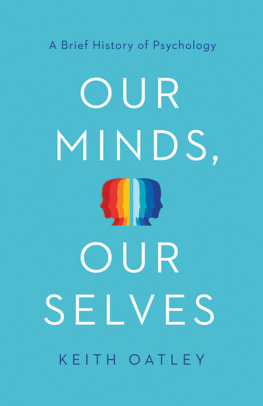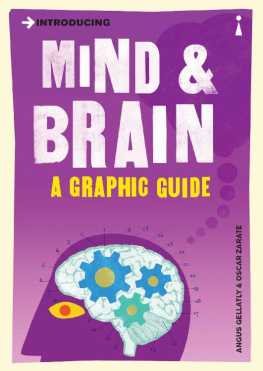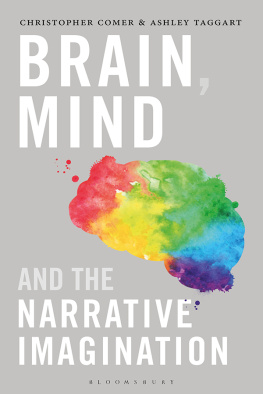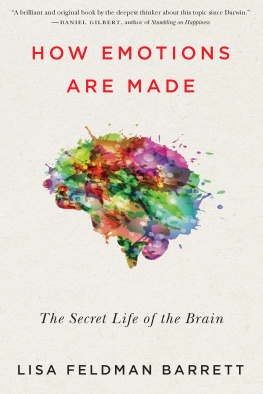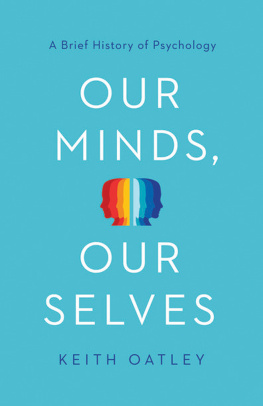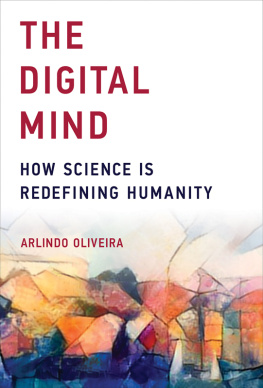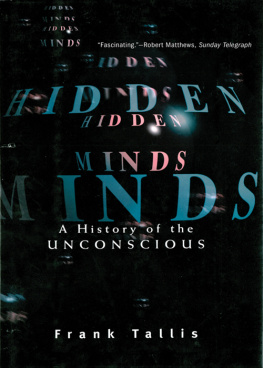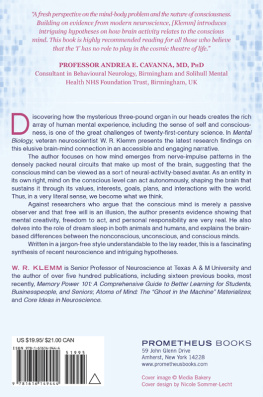
OUR MINDS, OUR SELVES
OUR MINDS, OUR SELVES
A Brief History of Psychology
Keith Oatley
Princeton University Press
Princeton & Oxford
Copyright 2018 by Keith Oatley
Requests for permission to reproduce material
from this work should be sent to
Permissions, Princeton University Press
Published by Princeton University Press,
41 William Street, Princeton, New Jersey 08540
In the United Kingdom: Princeton University Press,
6 Oxford Street, Woodstock, Oxfordshire OX20 1TR
press.princeton.edu
Jacket design by Faceout Studio, Lindy Martin.
Excerpt from With that moon language in The Gift by Daniel Ladinsky, copyright 1999, and used with his permission.
All Rights Reserved
Library of Congress Cataloging-in-Publication Data
Names: Oatley, Keith, author.
Title: Our minds, our selves : a brief history of psychology / Keith Oatley.
Description: Princeton : Princeton University Press, [2018] | Includes bibliographical references and index.
Identifiers: LCCN 2017033203 | ISBN 9780691175089 (alk. paper)
Subjects: LCSH: PsychologyHistory.
Classification: LCC BF81 .O24 2018 | DDC 150.9dc23
LC record available at https://lccn.loc.gov/2017033203
British Library Cataloging-in-Publication Data is available
This book has been composed in Sabon Next LT Pro
Printed on acid-free paper.
Printed in the United States of America
1 3 5 7 9 10 8 6 4 2
TO DAISY, AMBER, EWAN, KAYA, AND NANCY
CONTENTS
ACKNOWLEDGMENTS
Very many thanks to Jennifer Jenkins, my partner, who has read this book and made wonderfully helpful suggestions that have prompted amendments.
The book started with an invitation from Silvia Langford of Elwin Street. Among others who made suggestions at that stage were Mark Frary, Pippa Crane, Jeremy Stangroom, and Oliver Salzmann. Next, I took over management of the book myself, and Princeton University Press took it on. During this phase, Oliver Salzmann continued to be helpful. I am grateful to the books editor, Sarah Caro; to her assistant editor, Hannah Paul, of Princeton University Press in Oxford, UK; to Sara Lerner, the books production editor in Princeton; to Karen Verde, of Green Pelican Editorial Services, who copyedited the manuscript; to two helpful anonymous reviewers; and to my literary agent, Andrew Gordon. I thank, as well, the many others who have taught me, influenced me, and enabled me to think and write about the issues of this book.
PROLOGUE

What is this person thinking? Can we see from her eyes, or would it take longer to get to know her?
Are there principles of understanding others and ourselves, principles of how the mind works in our everyday lives, on which we can reflect?
What is going on in the mind of the person pictured above? Questions like this are central to psychology. We cannot look into someones eyes and see the soul. Instead, we wonder what kind of person this may be, imagine what she may be thinking and feeling. If we were to meet her, we might come to understand her more as we enter into conversation with her.
At the end of the twentieth century, Seiji Ogawa discovered the method of functional Magnetic Brain Imaging (fMRI), which enables activations in peoples brains to be monitored as they think, perceive, remember, experience emotions. It has been said that this method began a revolution comparable to that started by astronomer Nicolaus Copernicus when he proposed that the Earth revolves around the Sun.of enabling us to understand some of the brains bases of experience. In this book we will discuss findings made by brain imaging. But the aim is to go further: to suggest that the revolution is deeper, not just dependent on a new method.
A revolution is taking place in our understanding how the mind works to know the physical and social world. We are beginning now to understand some principles of the mind, not just to know which parts of the brain are active when we do this, or feel that, not just to know how behavior is affected by events, by social processes such as conversation, and by learning, but to reach inner understandings of the minds of others and ourselves.
You may have seen advertisements for ways to improve your memory or powers of thought. Such methods depend on exercises and practice; they are like working out in a gym. Practice is important, and we come to it in . But are there principles that enable us to think more deeply about human psychology? The answer is that some principles of this kind have been discovered, though others are only now being glimpsed. Each chapter of Our Minds, Our Selves concerns at least one significant principle in our understanding of who we are: not categorical statements, but to reflect upon.
PART ONE
Significant Ideas
Conscious and Unconscious

A shadow on a wall, of the kind Plato described in his parable of people in a cave who see such shadows rather than reality.
Though the mind is usually thought of as conscious, there are three kinds of unconscious knowledge. One, proposed by Plato, is that in this world, we are unconscious of eternal truths. Another, proposed by Sigmund Freud, is that aspects of ourselves that are unacceptable have become unconscious but can still affect our perceptions of others and our actions toward them. A third, proposed by Hermann Helmholtz, is probably the most important. It is the principle of unconscious inference: we project inner understandings, implicit theories, to infer what goes on in the physical world, and in the social world of our interactions with others.
Platos Cave
It is tempting to think that what we see is real. But what if the mind doesnt work by taking in reality? What if our minds depend in part on movements of which we are not conscious? What if some of these movements are not entirely about whats out there, but come from inner processes, in a way that affects what we see and know?
To invite us to think about this, Plato asked us to imagine that we are prisoners chained to a bench in a cave where we have been since childhood. Our necks are fastened so that we can look only straight ahead. In front of us, on a wall, we see people passing back and forth. This, said Plato, is the human condition. We cant turn around to see that behind us is a large fire that is casting shadows of people onto the wall. We think the shadows are reality.
Now suppose that we are freed. We turn around and look at the fire. Now we see actual people as they walk past, and see other prisoners still shackled. Imagine being taken up a steep ascent, out of the cave and into the light. At first we are dazzled, unable to distinguish much, but then we start to see the world as it is.
The Republic, published nearly 2,400 years ago, in which Plato wrote about the cave, was a significant moment in the history of psychology. Are shadows in a cave what we experience of the world?
With his metaphor of the cave, Plato reached a turning point. He suggested that although, in the world, we seem to experience truth in what we see, and seem to know what we are doing, other processes are at work. Plato was suggesting that we dont know some of the most profound things about the world. They cant be seen in the ordinary way.
Plato thought that before we were born we lived on another plane, as souls in the realm of ideals. Althoughas Plato thoughtin our souls we once knew unchanging truths, in our embodied lives we have forgotten them. Now we see only appearances, shadows onto which we project our beliefs, which are sometimes false. Ideals can, however, be drawn out from us by insightful teachers: the word education means to bring out or lead forth. In the history of education, the path out of the cave has come to include philosophy and mathematics, and the acquisition of skills of constructing theories and drawing inferences.
Next page
